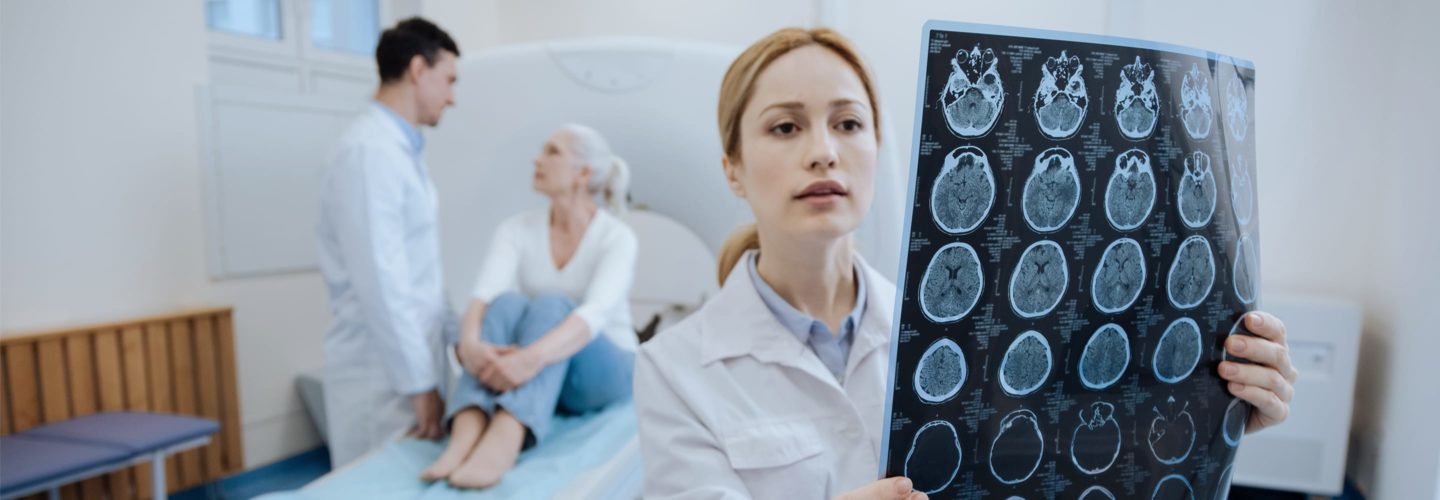The neurosurgery team at Maimonides includes world-class brain surgeons and spine surgeons who bring you advanced expertise and technology in a supportive environment.
We offer comprehensive neurosurgical care for brain and spine conditions, including brain and spinal tumors and more.
- Spine Surgery – We offer a wide range of treatments for acute and degenerative spine conditions and tumors. Maimonides was the first hospital in Brooklyn to offer minimally invasive spine surgery (MISS). MISS uses image-guided tools, providing the surgeon with more control and precision, typically resulting in smaller incisions, less scarring, shorter hospital stays and fewer complications.
- Brain Surgery – Our brain surgeons offer neurosurgical treatment options for cranial tumors and other conditions of the brain. Our surgeons use latest technologies to allow for the safest approach for each patient, including 3D imaging and stereotactic navigation. Our approach is highly individualized to lower pre- and post-operative complications and return you to your life quickly.
- Interventional neuroradiology – We use the latest technologies and minimally invasive endovascular approaches to treat aneurysms, arterio-venous malformations and acute stroke.
We take a conservative approach to surgery, recommending it when it is the best or only option. Surgery is typically recommended only after other treatments have failed to work.
We work closely with the rest of the Maimonides neurosciences team and other providers who may be involved in your care to ensure that you have comprehensive multidisciplinary care for the best outcomes.
Call Today: (718) 283-7219
Conditions treated
Our board-certified neurosurgeons specialize in brain and spinal surgery.
Our brain surgeons treat:
- Brain aneurysm
- Brain tumor
- Cerebral arteriovenous malformations (AVM)
- Chiari malformation
- Dural arteriovenous fistulae (DAVF)
- Hydrocephalus
- Pituitary tumors
- Skull base tumors
- Subdural hematomas
- Trigeminal neuralgia
Our spinal neurosurgeons are part of the Maimonides Spine Center and offer surgical and nonsurgical options to treat:
- Atlantoaxial instability
- Back pain
- Failed back syndrome
- Herniated disk
- Kyphosis and other spine deformities
- Neck pain
- Spinal stenosis
- Spinal trauma
- Spinal tumors
- Spondylolisthesis
- Spondylosis
- Vertebral fractures
Our interventional neuroradiologists treat:
- Brain Aneurysms
- Brain, head and neck and spine arterio-venous malformations
- Acute stroke
- Intractable headaches and facial pain (trigeminal neuralgia)
- Spinal compression fractures
If you and your health care providers decide surgery is right for you, we’ll create a comprehensive care plan tailored to your needs. The plan will include post-surgical care, follow-up appointments and, if necessary, rehabilitation.
Advanced neurosurgery treatments
Our advanced technology and capabilities include:
- O-Arm surgical imaging system
- 5-ALA tumor resection
- Dedicated neuro-monitoring
- Minimally invasive spine surgery (MISS)
- Neuro Intensive Care Unit, with neuro-intensivists and dedicated 24-hour neuro physician assistants With dedicated neuro-monitoring and neuro intensive care unit staffed with neuro-intensivists, you can have more peace of mind while you’re in the hospital. (Neuro-intensivists are physicians who specialize in taking care of people who need intensive care for neurological conditions.)
Our state-of-the-art angiography suite is equipped with advanced imaging equipment that enables the management of the most complex vascular lesions for neuro-interventional procedures. This technology enables us to see sequential scans quickly, allowing us to begin treatment sooner. We use minimally invasive technology and approaches to treat stroke patients, resulting in a high rate of opening clogged vessels in the brain.
Support for the whole you
At Maimonides, we focus on treating the whole person, not just the disease. So when you have surgery here, you’ll also have access to services to help you cope with your condition and the effects of treatment. These include:
- Nutritional consultation
- Pain management services
- Psychological and pastoral counseling
- Social work assistance
- Support groups





